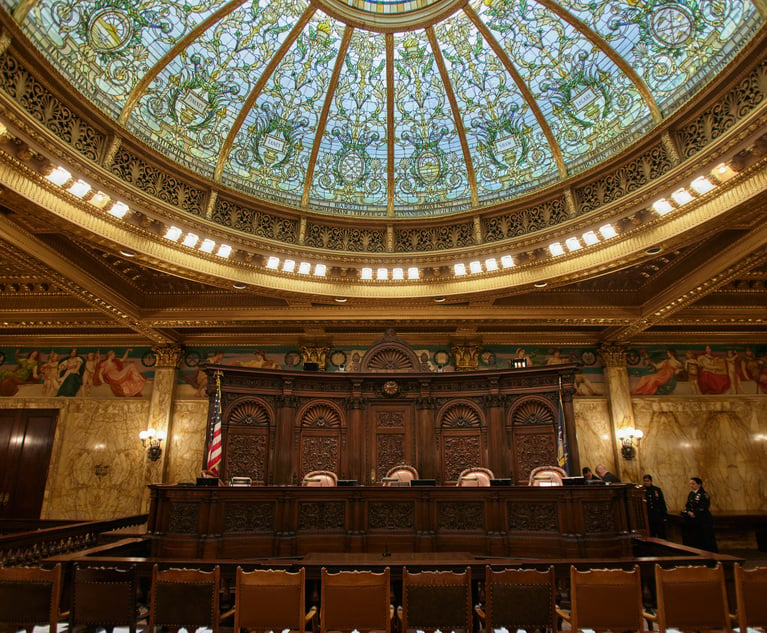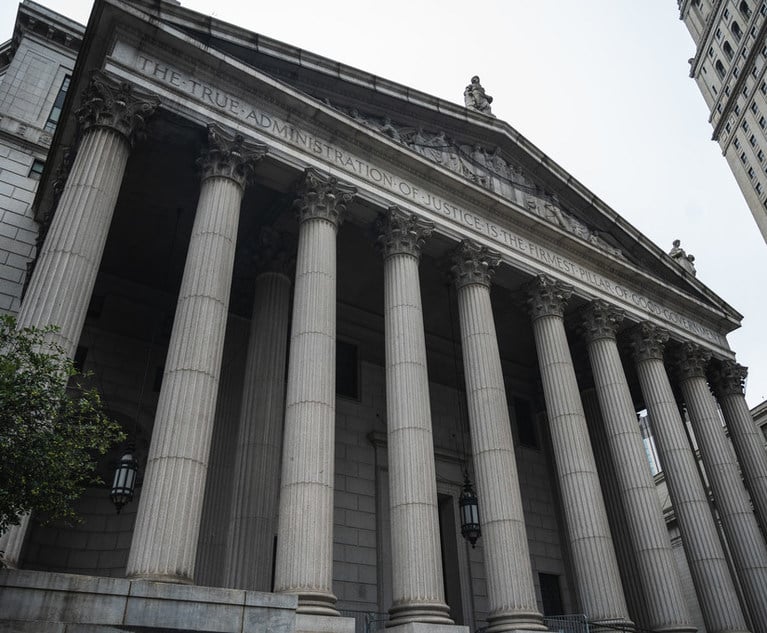Relief for Condominium Sponsors Due to the COVID-19 Pandemic
In her Ask the Former Regulator column, Erica F. Buckley addresses some limited relief afforded to condominium sponsors under certain executive orders signed by Gov. Andrew Cuomo.
June 11, 2020 at 11:53 AM
5 minute read
 Erica F. Buckley
Erica F. Buckley
Question: I am a sponsor of a new construction condominium in Brooklyn. My first year of operation was to start on March 1, but was delayed due to the pandemic. Is there any relief available to me that I should know about?
Answer: As of the date of this article, there is some limited relief afforded to sponsors under certain executive orders signed by Gov. Andrew Cuomo. On April 16, Cuomo signed Executive Order 202.18, which provides the following relief to condominium sponsors:
- The 15-month statutory deadline to convert rental properties to cooperative or condominium status is tolled. It should be noted that this tolling only applies to conversion plans in New York City under General Business Law Section 352-eeee;
- The requirement to update the budget for the first year of operation for certain offering plans, including new construction condominium plans, if the first unit closing does not take place within the first six months of the first year of operation is tolled. Sponsors will be required to update the budgets within 30 days from the expiration of the executive order instead, and so long as the budget amount doesn't increase by 25% or more, no right of rescission will be afforded to purchasers; and
- The requirement to have a unit closing within the first year of operation if the first closing does not happen within the first year of operation for new construction condominiums is tolled. Sponsors will be required to update the first year of operation within 30 days from the expiration of the executive order, and will not be required to offer rescission due to any delay in having the first closing within the first year of operation.
Generally, emergency executive orders that suspend other laws are effective for 30-day periods and may be renewed for additional 30-day periods upon reconsideration of the facts and circumstances. See N.Y. Exec. Law Section 29-A(2)(a). The relief provided for by Executive Order 202.18 was extended for two additional 30-day periods by Executive Orders 202.29 and 202.39, with the latter set to expire on July 7. While the Real Estate Finance Bureau has not issued guidance yet on how to handle the expiration of the executive orders, it is likely that such guidance from the bureau will liberally construe the executive orders to ensure sponsors are able to benefit from the relief afforded to them due to the real estate market having been on pause during the pandemic.
By way of example, if your first year of operation was disclosed to commence on March 1, you will likely be afforded the opportunity to extend that timeframe by three months, thereby disclosing a new first year of operation of June 1. In the normal course, if you failed to have your first unit closing by Feb. 28, 2021, you would be required to offer all purchasers in contract a right of rescission. See 13 N.Y.C.R.R. Section 20.3(o)(12). However, given the relief afforded to sponsors under the executive orders, you would now have an additional three months to have your first unit closing.
What is less clear is how the Attorney General will interpret other impacts to a proposed condominium that may have changed due to the pandemic. While the executive orders state that a mere delay in having the first unit closing should not be treated as a material and adverse change, it is unclear how other impacts from the pandemic will be handled. For example, if a sponsor is unable to deliver all of the amenities as promised due to the need to impose social distancing requirements, will the Attorney General require a right of rescission? While the Part 20 new construction regulations make clear that a budget increase of 25% or more or a delay in the first unit closing of more than a year are material and adverse, everything else is open to interpretation under the materiality standard. From case law, New York has adopted the materiality standard from federal securities law to determine when an omission is material and adverse. As described in the seminal case of State of New York v. Rachmani,
"It is this: 'An omitted fact is material if there is a substantial likelihood that a reasonable shareholder would consider it important in deciding how to vote * * * It does not require proof of a substantial likelihood that disclosure of the omitted fact would have caused the reasonable investor to change his vote. What the standard does contemplate is a showing of a substantial likelihood that, under all the circumstances, the omitted fact would have assumed actual significance in the deliberations of the reasonable shareholder. Put another way, there must be a substantial likelihood that the disclosure of the omitted fact would have been viewed by the reasonable investor as having significantly altered the "total mix" of information made available.'"
State of New York v. Rachmani, 71 N.Y. 2d 718 (1988), quoting TSC Industries v Northway, 426 U.S. 438 (1976).
While the executive orders provided relief to sponsors due to the delays caused by the pandemic, the relief did not go so far as to limit the Attorney General's ability to require rescission for other material and adverse changes. Therefore, sponsors will have to work closely with counsel in determining the overall impact of the pandemic on their offerings, keeping in mind that the standard for rescission is one based upon the materiality standard, which requires the Attorney General to find that the new disclosures to the offering plan are so extreme that had a buyer known of the new information, they likely wouldn't have bought to begin with.
Erica F. Buckley is the practice leader for the cooperative and condominium team at Nixon Peabody. She is the former chief of the Real Estate Finance Bureau at the New York Attorney General's office.
This content has been archived. It is available through our partners, LexisNexis® and Bloomberg Law.
To view this content, please continue to their sites.
Not a Lexis Subscriber?
Subscribe Now
Not a Bloomberg Law Subscriber?
Subscribe Now
NOT FOR REPRINT
© 2025 ALM Global, LLC, All Rights Reserved. Request academic re-use from www.copyright.com. All other uses, submit a request to [email protected]. For more information visit Asset & Logo Licensing.
You Might Like
View All
Decision of the Day: Trial Court's Sidestep of 'Batson' Deprived Defendant of Challenge to Jury Discrimination

Decision of the Day: Commercial Division Finds Defendant Engaged in Unfair Competition Against Plaintiff

Decision of the Day: Court Rules on Judgment Motions Over Police Killing of Pet Dog While Executing Warrant

Decision of the Day: JFK to Paris Stowaway's Bail Revocation Explained
Law Firms Mentioned
Trending Stories
- 1Uber Files RICO Suit Against Plaintiff-Side Firms Alleging Fraudulent Injury Claims
- 2The Law Firm Disrupted: Scrutinizing the Elephant More Than the Mouse
- 3Inherent Diminished Value Damages Unavailable to 3rd-Party Claimants, Court Says
- 4Pa. Defense Firm Sued by Client Over Ex-Eagles Player's $43.5M Med Mal Win
- 5Losses Mount at Morris Manning, but Departing Ex-Chair Stays Bullish About His Old Firm's Future
Who Got The Work
J. Brugh Lower of Gibbons has entered an appearance for industrial equipment supplier Devco Corporation in a pending trademark infringement lawsuit. The suit, accusing the defendant of selling knock-off Graco products, was filed Dec. 18 in New Jersey District Court by Rivkin Radler on behalf of Graco Inc. and Graco Minnesota. The case, assigned to U.S. District Judge Zahid N. Quraishi, is 3:24-cv-11294, Graco Inc. et al v. Devco Corporation.
Who Got The Work
Rebecca Maller-Stein and Kent A. Yalowitz of Arnold & Porter Kaye Scholer have entered their appearances for Hanaco Venture Capital and its executives, Lior Prosor and David Frankel, in a pending securities lawsuit. The action, filed on Dec. 24 in New York Southern District Court by Zell, Aron & Co. on behalf of Goldeneye Advisors, accuses the defendants of negligently and fraudulently managing the plaintiff's $1 million investment. The case, assigned to U.S. District Judge Vernon S. Broderick, is 1:24-cv-09918, Goldeneye Advisors, LLC v. Hanaco Venture Capital, Ltd. et al.
Who Got The Work
Attorneys from A&O Shearman has stepped in as defense counsel for Toronto-Dominion Bank and other defendants in a pending securities class action. The suit, filed Dec. 11 in New York Southern District Court by Bleichmar Fonti & Auld, accuses the defendants of concealing the bank's 'pervasive' deficiencies in regards to its compliance with the Bank Secrecy Act and the quality of its anti-money laundering controls. The case, assigned to U.S. District Judge Arun Subramanian, is 1:24-cv-09445, Gonzalez v. The Toronto-Dominion Bank et al.
Who Got The Work
Crown Castle International, a Pennsylvania company providing shared communications infrastructure, has turned to Luke D. Wolf of Gordon Rees Scully Mansukhani to fend off a pending breach-of-contract lawsuit. The court action, filed Nov. 25 in Michigan Eastern District Court by Hooper Hathaway PC on behalf of The Town Residences LLC, accuses Crown Castle of failing to transfer approximately $30,000 in utility payments from T-Mobile in breach of a roof-top lease and assignment agreement. The case, assigned to U.S. District Judge Susan K. Declercq, is 2:24-cv-13131, The Town Residences LLC v. T-Mobile US, Inc. et al.
Who Got The Work
Wilfred P. Coronato and Daniel M. Schwartz of McCarter & English have stepped in as defense counsel to Electrolux Home Products Inc. in a pending product liability lawsuit. The court action, filed Nov. 26 in New York Eastern District Court by Poulos Lopiccolo PC and Nagel Rice LLP on behalf of David Stern, alleges that the defendant's refrigerators’ drawers and shelving repeatedly break and fall apart within months after purchase. The case, assigned to U.S. District Judge Joan M. Azrack, is 2:24-cv-08204, Stern v. Electrolux Home Products, Inc.
Featured Firms
Law Offices of Gary Martin Hays & Associates, P.C.
(470) 294-1674
Law Offices of Mark E. Salomone
(857) 444-6468
Smith & Hassler
(713) 739-1250






